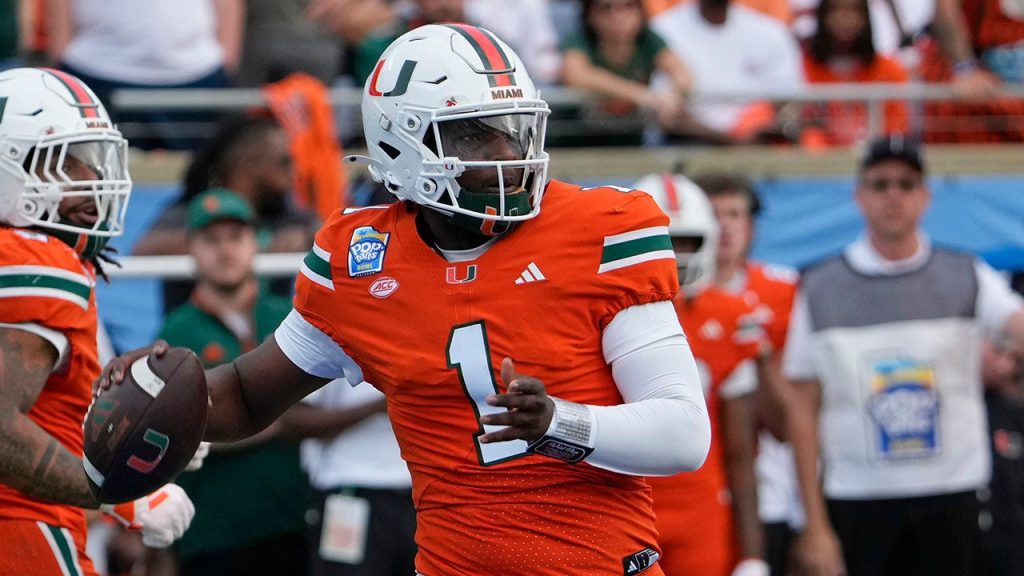Cam Ward, the Miami Hurricanes quarterback and a projected top NFL Draft pick, etched his name into NCAA Division I history during the Pop-Tarts Bowl against Iowa State. In the first quarter, Ward connected with Jacolby George for a touchdown, his 156th career scoring pass, surpassing the previous record held by Case Keenum. This historic achievement culminated a season of personal and professional growth for Ward, who reflected on his time with the Hurricanes as the best team experience of his career. However, the celebratory moment was soon overshadowed by a controversial coaching decision. Following the record-breaking pass, Ward was benched for the remainder of the game, replaced by Emory Williams. The Hurricanes ultimately lost the game 42-21. Head coach Mario Cristobal remained tight-lipped about the rationale behind the substitution, stating post-game that such decisions are handled internally. Cristobal, however, did praise Ward’s character and impact on the team, emphasizing his positive influence on the program, alumni, and wider community.
The unexpected benching generated significant buzz on social media, with many questioning the timing and reasoning behind the decision, particularly given the historical significance of Ward’s achievement. The move also sparked debate about player safety versus competitive spirit in bowl games, especially for athletes with NFL aspirations. Ward’s record-breaking performance adds an intriguing layer to the upcoming NFL Draft landscape. He joins a group of highly touted quarterback prospects, including Shedeur Sanders, Quinn Ewers, and Carson Beck, all vying for early-round selections. Ward’s strong arm, combined with his demonstrated leadership and resilience, are expected to make him a highly sought-after prospect by NFL teams.
The previous record holder, Case Keenum, amassed 155 touchdowns during his college career with the Houston Cougars from 2007 to 2011. His record stood as a benchmark for quarterback excellence in college football’s Division I, encompassing both the Football Bowl Subdivision (FBS) and the Football Championship Subdivision (FCS). Ward’s surpassing of this mark signifies a new era in college football and highlights the evolving offensive landscape of the game. Another quarterback, Dillon Gabriel of Oregon, is also nearing Keenum’s record, currently holding 153 touchdown passes over six seasons. With Oregon’s potential participation in the College Football Playoff, Gabriel has a chance to further climb the leaderboard and potentially surpass Keenum’s record.
Ward’s journey to this record-breaking moment is a testament to his dedication, perseverance, and ability to thrive in a high-pressure environment. His leadership qualities and positive impact on the Miami Hurricanes program, as acknowledged by Coach Cristobal, further underscore his value both on and off the field. These qualities are highly coveted by NFL scouts and coaches, suggesting a bright future for Ward at the professional level. While the circumstances surrounding his benching in the Pop-Tarts Bowl remain unclear, the focus remains on Ward’s historic accomplishment and his potential to become a leading quarterback in the NFL.
The NFL Draft anticipation surrounding quarterbacks like Ward, Sanders, Ewers, and Beck underscores the importance of the quarterback position in modern football. These players represent the future of the sport, bringing unique skill sets and leadership qualities to the table. Their performance in college serves as a preview of the potential impact they could have on NFL franchises. The draft process will be a crucial period for these quarterbacks, as they showcase their abilities and convince teams of their potential to be franchise-defining players.
The evolving landscape of college football, with its increasingly complex offensive schemes and emphasis on quarterback play, has created a fertile ground for record-breaking performances like Ward’s. The emergence of multiple quarterbacks vying for touchdown records suggests that the passing game will continue to dominate the sport for the foreseeable future. This trend is likely to influence NFL strategies as well, with teams increasingly prioritizing quarterbacks who can execute sophisticated passing attacks and make game-changing plays. The future of football, both at the collegiate and professional levels, will be shaped by the talents and leadership of quarterbacks like Cam Ward.

